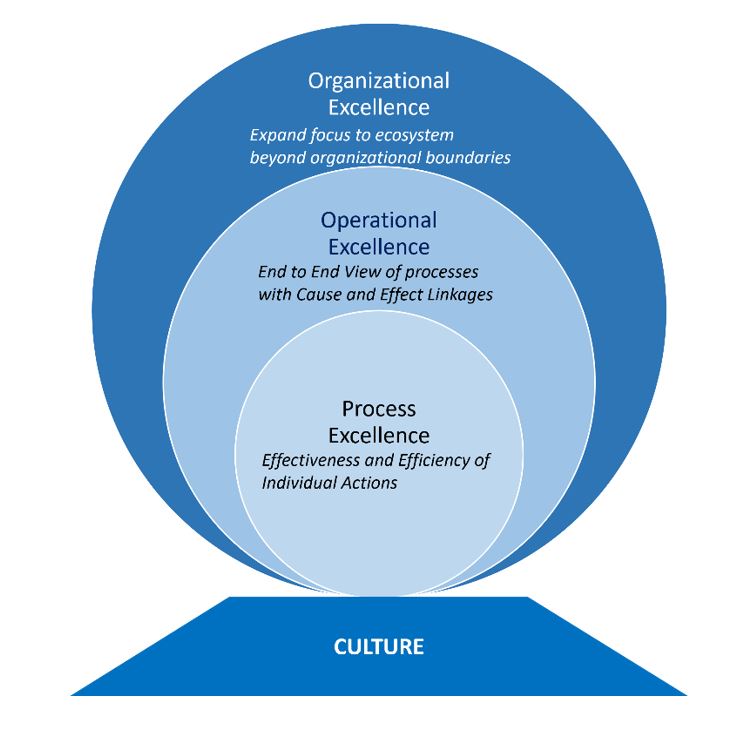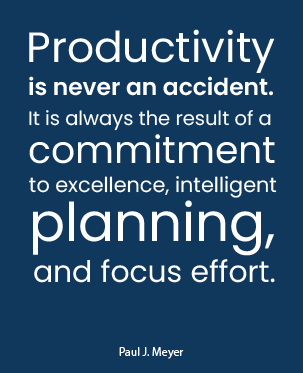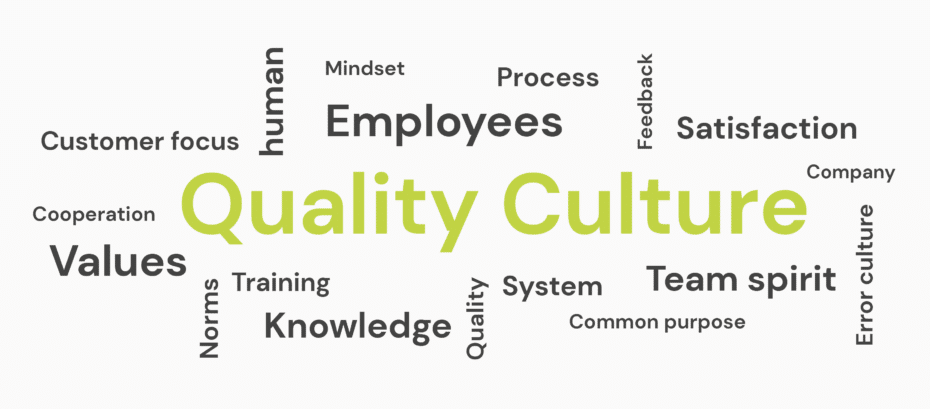Companies that achieve organizational excellence do more than just meet expectations; they set benchmarks in quality, efficiency, and innovation. According to the American Society for Quality (ASQ), organizational excellence is the consistent delivery of superior performance. But how is it achieved?
This blog explores the guiding principles, actionable strategies, and defining traits of organizational excellence. We’ll also highlight how The Leadership Circle’s leadership development tools play a vital role in transforming leaders to drive excellence within their organizations.
Defining the Foundation of Organizational Excellence
Before we get into the practical steps, let’s explore the foundational principles that define organizational excellence. These core concepts serve as the bedrock for building resilient, innovative, and aligned organizations.

Continuous Improvement
At the heart of excellence lies the commitment to growth. This principle revolves around leveraging data-driven feedback loops to refine processes and decision-making continually. Tools like maturity models and balanced scorecards enable organizations to screen for inefficiencies and refine their workflows systematically.
For leadership development, tools like the Leadership Circle Profile (LCP) facilitate self-awareness among leaders, encouraging them to optimize their impact and create positive ripple effects throughout the organization.
Clear Vision and Alignment
Every organization pursuing excellence must start with a comprehensive understanding of its purpose and goals. 9P Framework touches on this as they discuss vision alignment, where team efforts are explicitly tied to organizational objectives. Leadership plays a pivotal role here, ensuring communication of goals across every layer of the organization.
Consider leadership measurement systems like LC’s Leadership System, a program that focus on aligning individual performance metrics with broader organizational goals.
Commitment to Quality
Quality is not just an outcome but an organizational mindset. Organizations achieve excellence by embedding quality into products, processes, and employee actions. Traits like integrity and accountability are critical for instilling this mindset within leadership roles.
Practical Strategies to Elevate Excellence
Understanding core principles is essential, but achieving excellence requires actionable strategies. Here we explore how leadership and culture contribute to driving the needle toward exceptional performance.

Engaging Leadership
Leaders play a catalytic role in inspiring teams and shaping organizational culture. Engaged leaders foster collaboration, build trust, and connect individual efforts with shared goals. For example, The Leadership Circle’s coaching services empower executives to develop relational leadership skills that enhance team dynamics and maintain high-performance levels.
Practical strategies include:
- Regular team feedback sessions to ensure alignment.
- Modeling accountability and cultivating openness to feedback.
- Leveraging storytelling to inspire vision and values.
Fostering Innovation
Innovation is often labeled as the heartbeat of thriving organizations. Strategies to boost innovation include promoting a culture of curiosity, risk-taking, and continuous learning. Adaptability also becomes critical here.
Creative problem-solving, as empowered by Leadership Circle’s training programs, allows leaders to view challenges as opportunities to innovate, making their organizations more agile and resilient to market shifts.
Data-Driven Decision-Making
Excellence thrives on insight, not intuition. Tools like balanced scorecards and predictive analytics create an evidence-based ecosystem for decision-making. By leveraging insights from the Leadership Circle Profile, leaders can measure their growth and refine their strategies effectively.
Core practices include:
- Regularly tracking KPIs to evaluate progress.
- Introducing AI and analytics tools for operational intelligence.
- Building a decision-making culture grounded in factual evidence.
The Traits Shared by Excellent Organizations
Organizations known for their excellence consistently exhibit key traits, which serve as benchmarks for others striving to reach the same level of success.

Adaptability and Resilience
The ability to pivot during adverse conditions is instrumental. Whether it’s navigating market disruptions, technological advancements, or organizational challenges, adaptability allows businesses to adjust and stay ahead. By fostering emotional intelligence within leadership, Leadership Circle equips executives to handle complexity and uncertainty effectively.
Collaboration and Communication
Strong collaboration thrives on transparent communication. Leaders who invest in relational strategies build trust across departments, ensuring seamless knowledge-sharing and problem-solving.
Customer-Centric Mindset
Placing customers at the heart of the organization is a hallmark of excellence. This involves prioritizing customer experience, satisfaction, and feedback to build loyalty and drive business value. Initiatives like loyalty programs or client-centric innovation pave the path for long-term customer retention.
The Leadership Circle’s Distinctive Contribution to Excellence
At the forefront of organizational excellence is leadership transformation. Leadership Circle bridges the gap between individual growth and enterprise success through its innovative tools, consulting services, and coaching programs. Here’s how:
- Leadership Circle Profile (LCP): Encourages leaders to reflect on their core behaviors, beliefs, and mindset through data-backed feedback.
- Coaching Services: Strengthen leaders’ abilities to foster creative problem-solving and adapt to complexity.
- Organizational Consulting: Enables businesses to transform leadership into their competitive advantage with tailored strategies and insights.
Real-Life Impact
A global technology organization recently partnered with Leadership Circle to develop its senior leadership team. Using LCP assessments, leaders identified reactive tendencies that limited collaboration and innovation. Over a 12-month coaching program, the results were striking—employee engagement scores improved by 24%, and the team successfully exceeded all KPIs for the fiscal year.
Excellence Is a Journey, Not a Destination
Achieving organizational excellence demands relentless focus on principles, consistent application of strategies, and ongoing evaluation of results. At Leadership Circle, we’re proud to empower organizations and individuals alike to make excellence a sustainable part of their DNA. Are you ready to elevate your organization to the next level?
Take the Next Step
Schedule a consultation with Leadership Circle today to discover customized solutions that can transform your leadership and foster organizational excellence. It’s time to turn your vision of success into reality.






Your writing always leaves me feeling uplifted and empowered. Thank you for being such a positive influence.
Your blog is a treasure trove of valuable insights and thought-provoking commentary. Your dedication to your craft is evident in every word you write. Keep up the fantastic work!
Your blog is like a beacon of light in the vast expanse of the internet. Your thoughtful analysis and insightful commentary never fail to leave a lasting impression. Thank you for all that you do.
Your blog is a testament to your passion for your subject matter. Your enthusiasm is infectious, and it’s clear that you put your heart and soul into every post. Keep up the fantastic work!
I wanted to take a moment to commend you on the outstanding quality of your blog. Your dedication to excellence is evident in every aspect of your writing. Truly impressive!
Your blog has quickly become my go-to source for reliable information and thought-provoking commentary. I’m constantly recommending it to friends and colleagues. Keep up the excellent work!
Your blog is a shining example of excellence in content creation. I’m continually impressed by the depth of your knowledge and the clarity of your writing. Thank you for all that you do.
Your blog is a constant source of inspiration for me. Your passion for your subject matter is palpable, and it’s clear that you pour your heart and soul into every post. Keep up the incredible work!
Your blog is a testament to your dedication to your craft. Your commitment to excellence is evident in every aspect of your writing. Thank you for being such a positive influence in the online community.
This is such a well-researched and well-written article! I’ve gained a new perspective on the topic, and your explanations made everything easy to follow and understand.
Your writing has a way of resonating with me on a deep level. It’s clear that you put a lot of thought and effort into each piece, and it certainly doesn’t go unnoticed.
Your blog has quickly become my go-to source for reliable information and thought-provoking commentary. I’m constantly recommending it to friends and colleagues. Keep up the excellent work!
Your article was not only informative but also a pleasure to read. I’ve been looking for content like this that combines depth with readability.
Your blog is a testament to your dedication to your craft. Your commitment to excellence is evident in every aspect of your writing. Thank you for being such a positive influence in the online community.
I wanted to take a moment to commend you on the outstanding quality of your blog. Your dedication to excellence is evident in every aspect of your writing. Truly impressive!
Your blog is a constant source of inspiration for me. Your passion for your subject matter shines through in every post, and it’s clear that you genuinely care about making a positive impact on your readers.